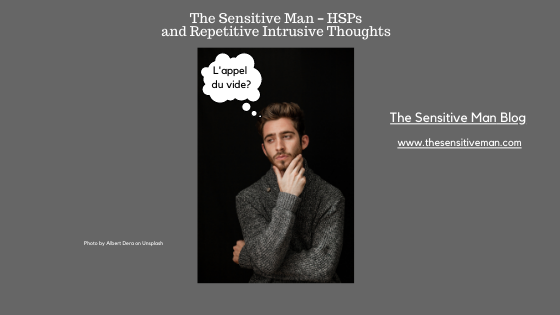|
A Blog about Sensory Processing Sensitivity from the Worldview of a High Sensing Male
Have you ever had a recurring, intrusive thought or thoughts invade your thought space? You know, the mostly involuntary thoughts, perhaps, unpleasant, and even a bit scary. Thoughts of death, yours or someone else’s, thoughts of committing some unspeakable act, or maybe even performing some sexual act that goes against your grain? A few years back, I wrote a blog about something similar that the French call “l’appell du vide,” or the call of the void. I bent the definition a bit to make a point about taking a leap of faith. However, the strictest definition of l’appel du vide is an intrusive thought to end it all – swerve on the centerline, leap over the edge, pull the trigger, or jump into the void. These intrusive types of thoughts have other names- negative automatic thoughts, obsessive thoughts, worry, rumination, or yes, intrusive thoughts. I have wondered lately if these thoughts plague other highly sensitive people. Highly sensitive people do seem to tend to worry (future thinking) or ruminate (past thinking) about a lot in their lives. Does that make us more susceptible to intrusive thoughts? Could these intrusive thoughts be the origin point of our rumination or perpetual worry? Do highly sensitive people see these intrusive thoughts as unfavorable, or merely some quirkiness of our personalities, odd but still adaptive. Some types of rumination are considered a kind of cognitive emotion regulation. Apart from being some pathology such as Obsessive-Compulsive Disorder (OCD), it appears that we all experience these little fireflies of intrusiveness, flickering off and on in our brains from time to time. Intermittent intrusive thoughts are normal and quite common if they remain transient and don’t become obsessive rumination. What are intrusive thoughts? Intrusive thoughts are generally involuntary thoughts or flashes with unpleasant overtones, and if repetitive, can be distressing or feel difficult to manage. For most of us, they are a momentary annoyance and are never acted upon. They can jolt you because the nature of these thoughts is often an imagined act of carelessness, violence, or sexual promiscuity. Imagine the devil on your shoulder, easily swatted off but sometimes persistent and tiresome. Just having these thoughts doesn’t mean that you are weird or have uncontrollable issues. Remember, it is a matter of degree. Everyone gets them, even thoughtful, well-meaning HSPs. Is there a point when these thoughts should cause you to worry? The moment you become obsessive about the thought, however disturbing, you are likely calling the thought back in a repetitive way, just by becoming preoccupied with it. Consider this, we sometimes create random, meaningless residue as Dr. Martin Seif and Dr. Sally Winston refer to the detritus that our brain sometimes create as “junk thoughts” Most of these are just that – junk. The more energy you put into it, the likelier you are creating a neural pathway for that thought. You are making it obsessive, and it will repeat the more you think about it. You can see where this may be going. Sometimes these thoughts are simply a way the brain communicates a sign that there might be something else wrong in your life . The thoughts often bubble up from the unconscious and, like dreams, may be full of symbolism, not to be interpreted literally. Yet, there may be a message there. Then again, it may just be junk. Regardless, don’t obsess about it. HSPs and Intrusive Thoughts Are HSPs more likely than non-HSPs to have intrusive thoughts? That is an intriguing question with no definitive answer. The fact that HSPs tend to be deep processors of thoughts and that we are sometimes emotionally reactive, it would seem the ingredients are there for this type of thinking. HSPs can be more anxious, with the antecedent being unconscious anxiety bubbling up into consciousness. HSPs that are more inclined to depression may also have problems with rumination or running thoughts repeatedly as a form of self-punishment or negative self-talk. Does that mean all HSPs will have this problem? No, but for HSPs with a history of trauma, OCD or depression may have more trouble with these recursive thoughts simply because we are wired for deep processing. We tend to have a more substantial internal monologue, including inner discourse about ourselves, our lives, and our relationships with the world. This self-talk is not a bad thing in itself, but without testing externally these ideas spawned by our self-talk, we may get looped in erroneous thinking. Bad dialogue can get driven down into the unconscious with repetition and can be served up again as intrusive thoughts. Do we need to control intrusive thoughts? Not really. As was stated previously, the less we dwell on these thoughts, the better. They come and go and releasing them as they come into awareness is probably your best strategy. Recognize that it is nearly impossible to control all your thoughts . It is not just about mindfulness either; if you try to suppress these thoughts or any thought mindfully, you will likely only bring it back. Think about being told not to think about something – what do you wind up thinking about? Yup. Only become concerned if they turn into an obsession. Likely this is related to some other matter, perhaps the beginning of a problem or the continuance of an ongoing issue, generalized anxiety, depression, or obsessive-compulsive issues that need professional attention. Like most HSPs, we tend to keep our internal house (our mind) safe, clean, and habitable. We live there a lot and having something weird pop into our minds unexpectedly can be exasperating. Recognize and see intrusive thought for what it is – a fleeting thought, a mere firefly of the mind. Like a firefly in hand, observe for a moment, release your grip, and let the thought go, flying away into the darkness. Please share your thoughts in the comment section.
0 Comments
Leave a Reply. |
AuthorBill Allen currently lives in Bend, Oregon. He is a certified hypnotist and brain training coach at BrainPilots.com. He believes that male sensitivity is not so rare, but it can be confounding for most males living in a culture of masculine insensitivity which teaches boys and men to disconnect from their feelings and emotions. His intent is to use this blog to chronicle his personal journey and share with others. Archives
July 2024
Categories
All
|



 RSS Feed
RSS Feed
